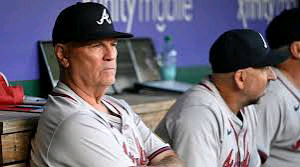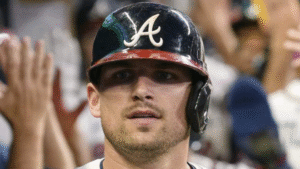
Introduction & Context: A Closer Look at the Braves’ Situation
Baseball fans and analysts alike have turned their attention to the state of the Atlanta Braves, who — despite recent flashes of competence — continue to hover around mediocracy and underperformance. The backdrop is stark: once a perennial contender and a 2021 World Series champion, the franchise now finds itself in the unfamiliar territory of trailing in the National League East division. After consecutive postseason runs (including a remarkable 104-win season in 2023) and the crowning achievement of a championship, the Braves are grappling with underwhelming results in 2025. Having slipped under the .500 mark with a 37–42 record and lingering seven games behind the division leader, their slump stirred widespread speculation over whether they might shake things up before the July trade deadline.
Recent Momentum
Despite their overall struggles, the Braves have captured a glimmer of resurgence. In their last 10 games, they’ve posted a respectable 6–4 record, showing signs of vitality and resilience. These efforts have not gone unnoticed — pundits have pointed to a potential rebound, suggesting that, should the team string together more wins, there’s a credible path back into playoff contention. Still, their third-place standing in the division continues to fuel doubt about the viability of their current roster.

The Payroll Conundrum & Fan Frustration
Resurgent Baseball, Recurring Problems
The juxtaposition is clear: four years removed from their World Series triumph, the Braves find their engine sputtering. The brilliance of their peak — particularly the 104 wins in 2023 — now contrasts sharply with their current slump, leaving fans and analysts contemplating whether the roster has plateaued. While not entirely absent from contention, the team’s inconsistency raises questions about sustainability. Most of the organization’s marquee signings remain under contract, locking in a hefty payroll that reaches deep into the future and limits flexibility.
Money vs Performance: A Financial Impasse
Beyond wins and losses, a financial story lurks beneath the surface: salary commitments. The Braves have secured key players with long-term extensions. On one hand, these extensions were meant to preserve the core group that brought success. On the other, they’ve created a burden — large-scale, guaranteed contracts take up substantial payroll space, making it difficult for the front office to pivot.
Analysts argue that the team’s inability to shed bloated deals hampers their ability to recalibrate. Indeed, in the face of underwhelming results, financial pragmatism might force the Braves to contemplate drastic moves — potentially trading off assets simply to clear salary and regain financial wiggle room.
Spotlight on Austin Riley: From Cornerstone to Trade Chip?
Among the Braves’ core players, one figure has recently attracted intense trade speculation: third baseman Austin Riley. At just 28 years old, Riley represents both stability and contradiction — a talented player earning top dollar, yet one whose recent offensive output has failed to meet lofty expectations.
Why Riley is Generating Trade Rumors
According to Bleacher Report — specifically an article authored by Zach Rymer — Riley’s name has surfaced as a prime candidate for a midseason trade. Rymer places him among the top eight trade-eligible players in baseball, based on several criteria:
1. Contract Load
Riley is locked into a long-term, seven-figure extension (10 years, approximately $212 million), which extends through 2032. For a team looking to reduce payroll, his contract represents a significant target.
2. Recent Performance Slide
Offensive metrics haven’t fully justified his salary. In 2024, he recorded a 114 OPS+ and followed with a 110 OPS+ in the current season. While not poor, these numbers constitute a decline from his All-Star and elite performances earlier in his career.
3. Strategic Reassessment
Bleacher Report frames the situation bluntly: four years post-championship and with diminishing returns, the Braves have reached a point where trimming payroll may outweigh the cost of losing a homegrown cornerstone player.
Would Other Teams Bite?
Yankees & Opportunistic Trade Scenarios
Buzz around Riley isn’t contained to Atlanta; rumors point to potential suitors, notably the New York Yankees. The Athletic’s Brendan Kuty floated the idea in April, envisioning the Bombers making a call if their team remains in need of impact talent.
> “The Yankees (and many other teams) surely would like the idea of Austin Riley,” Kuty wrote .
He emphasized that the Yankees — known for their aggressive offseason and deadline splurges — might be interested if the Braves make him available in a fire sale.
Trade Feasibility
But is Riley really on the table? Reports suggest that, while Atlanta isn’t in fire-sale mode, the front office is pragmatic. The consensus is this: if the team remains under .500 into late July, they may reluctantly consider deals, especially for impending free agents like Marcell Ozuna — or even long-term contract players like Riley.
Chris Sale: Secure or Shake-Up?
Anthopoulos’ Promise
While Riley’s future may be hazy, there’s one player firmly off the table: veteran pitcher Chris Sale. Newly acquired and fresh off a National League Cy Young Award, Sale represents a centerpiece. Braves president of baseball operations Alex Anthopoulos publicly promised that Sale is not going anywhere.
> In a recent interview, Anthopoulos was “adamant that the club is not trading reigning National League Cy Young Award winner Chris Sale under any circumstances” .
A Buyer’s Mindset
Anthopoulos also emphasized that the Braves remain in “buy” mode, still aspiring to chase that elusive postseason berth. Their preference, at least for now, is to react to success — not panic out of it. That said, he left the door open for trades if the team continues slipping, signaling that pragmatism may prevail over idealism.
The Offseason Angle
Payroll Flexibility as a Tool
Immediate concerns aside, the potential for trade offers at the deadline isn’t just about 2025. It’s about setting the stage for future seasons. Releasing salary now could allow the Braves to:
Reset their roster in 2026, when several extensions wrap up.
Free up cash to pursue free agents or retain expiring assets.
Reassess their competitive strategy — are they torn between live-in contender and rebuild?
Can They Afford to Keep Him?
Many factors play into any decision. On one side, Riley is young, experienced, and versatile — a proven player around whom rebuilding or retooling could pivot. On the other, sunk costs abound: keeping him limits financial flexibility, especially after signing other locked-in veterans.
The Diamond vs The Ledger
Baseball Arguments
Analysts weigh the baseball argument heavily. Riley may be in an offensive rut, but metrics show he’s still a valuable contributor. Even with a 110 OPS+ this season, that’s 10% better than league average. A team willing to be patient could see him return to peak form.
His defensive versatility is also a plus — capable at third base, a position often challenging to fill. Replacing his presence with a comparable bat in the system or on the market would be difficult and costly.
Financial Arguments
Yet money talks loudly in front offices. Locked between salary burdens and heightened expectations, the Braves may feel compelled to trade a high-value player to shed payroll, even if it means giving up a future star. In many ways, Austin Riley exemplifies the crossroads of the baseball and financial decision.
Possible Trade Scenarios
Who Comes Calling?
If the Braves do make Riley available, who might be interested? Several teams come to mind:
1. New York Yankees
A perennial competitor with cash to burn, deep pockets, and perennial holes on the corner—infield.
2. American League West Contenders
Teams like the Texas Rangers, Houston Astros, or Seattle Mariners may consider upgrading their lineup.
3. Other Clubs Looking for a Bat
Any playoff hopeful struggling to find third base consistency, including teams like the St. Louis Cardinals or Cleveland Guardians, might be intrigued.
What Could They Offer?
A trade involving Riley would likely command a heavy prospect package — high-upside pitching or young positional talent from teams not satisfied with their own shots at the postseason. For a contending team, his return on investment could be immense if he recaptures his 2021 form.
Weighing All the Variables
Short-Term vs Long-Term
Short-term Gain: Cutting payroll immediately, plugging holes, becoming nimble.
Long-term Cost: Losing a young star with peak years ahead.
The Braves must decide whether to chase this year’s win-now window or reset around younger, cheaper talent for the coming seasons.
Fan & Cultural Considerations
Riley has endeared himself to the fan base. Moving him could sting — a gesture that might alienate fans yearning for stability and success. How much weight should that carry? Freely trading fan favorites can be politically sensitive for organizations mindful of optics.
Projections: What Might Actually Happen
Based on patterns and recent quotes:
Chris Sale: Guaranteed safe — Anthopoulos confirmed that unequivocally.
Other Veterans: Free agents like Marcell Ozuna could become the first candidates to go as July approaches.
Austin Riley: His move depends on how “further south” performance gets. If the Braves slump past July 25 with no momentum, he joins the discussion. But a hot July could keep him in Atlanta.
Conclusion
The situation is layered:
1. Performance: Under .500 currently, yet slightly improved.
2. Payroll: High payroll from long-term contracts limits flexibility.
3. Asset Values: Riley remains high-value on and off the field.
4. Management Signals: Anthopoulos says they’re buyers—unless circumstances force their hand.
At this point, Riley’s future is not sealed but uncertain. The coming weeks will determine whether the Braves lean into contention or reset their sails. If they slide further, a blockbuster involving Riley could follow — a move many find disconcerting but financially defensible. However, if positive momentum continues, Atlanta may stick with its core, hoping its star players re-establish dominance.
All told, the storyline unfolding in Atlanta blends on-field ambition with financial reality. The choices ahead highlight both the beauty and burden of modern baseball economics: building for wins now often means building with collective long-term risk. Austin Riley sits at the crux — a player as much emblematic of present hope as potential sacrifice. His fate may define the Braves’ direction for seasons to come.
Leave a Reply